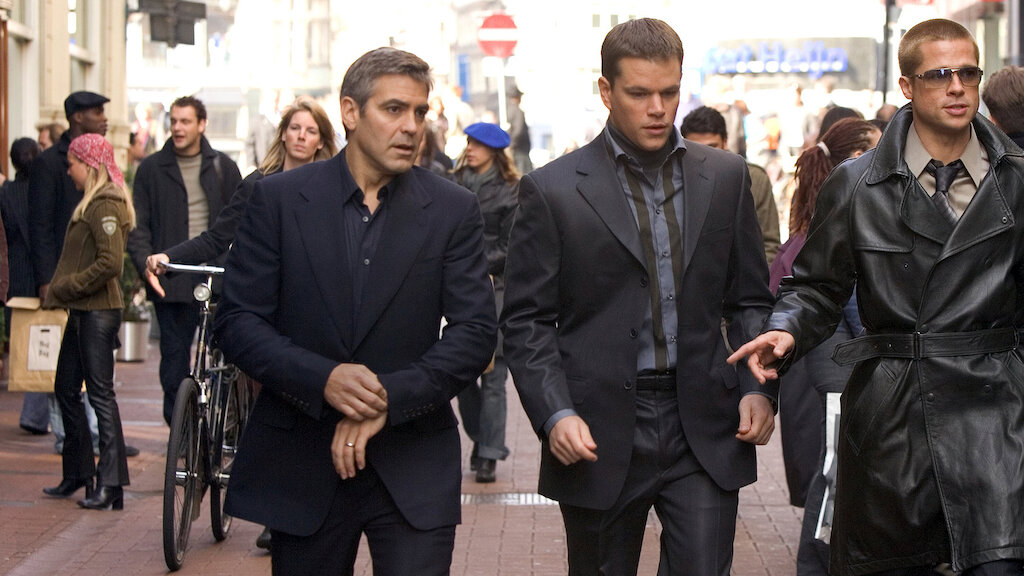Everyone and their mother loves Ocean’s Eleven. It stands tall to this day, almost two decades after its initial release, as one of the great heist movies in the history of cinema, and is essentially universally regarded as such. Held together by one of the most astoundingly talented ensemble casts in all of modern cinema, the chemistry and wit of the famous Eleven launches the film toward stratospheric levels of fun, paired with an extremely clever and engaging heist narrative. To go along with this, although his contribution can often be overlooked, director Steven Soderbergh’s unbelievable fluency with the language of cinema allows him to play it fast and loose with the rules of narrative and camera movement, allowing him to craft an entirely unique take on the genre that has not been replicated outside of his own franchise since. The film spawned two sequels in Ocean’s Twelve and Ocean’s Thirteen in the ensuing years, as well as an all-female reboot with Ocean’s Eight, none of which reached the same levels of critical acclaim or box office gross. Does this mean that — as seems to happen so often in Hollywood — after the raging success of Eleven, it all went downhill from there?
Despite what many critics might tell you, the answer is emphatically no. In fact, one might even argue that the beloved franchise did not even peak at its origin. Instead, that honor goes to the film’s immediate sequel: Ocean’s Twelve. Perhaps the most critically maligned of all the films of the entire franchise — even being named one of the 25 worst sequels ever made by Entertainment Weekly — its base of loyal followers who understand the true greatness of the film has been growing steadily since its release in 2004, even if the grander consensus remains firmly in the negative column.

Ocean’s Twelve picks up 3 years after the glorious centerpiece heist of Eleven, where the gang pulled off heists of 3 Vegas casinos in one night and got away with $160 million between the group. Unfortunately for them, Terry Benedict, the devilish owner of all three casinos, has tracked them all down, and is demanding to be repaid in full plus interest for the money that was stolen. Unable to come up with the cash, the crew is forced to go abroad to Europe and find a way to pull off a series of heists before Benedict comes after them. Along the way, they are met by another master thief known as the “Night Fox” who wishes to prove that he is the superior mastermind and thus challenges them to a contest to see who can steal the Imperial Coronation Fabergé Egg first.
The most important thing to realize about this film in order to truly appreciate it, however, is to realize that the basic plot structure does not matter. What is described above is an accurate spoiler-free synopsis of what the film is “about”, but in the end it really means nothing. Much of the film’s criticisms emerge from claims that many (if not most) of the plot elements are completely unrealistic, ridiculous in nature, or nonsensical in logic. These criticisms are, surprisingly enough, pretty much true across the board, yet this film does not operate on the same logic as its predecessor, and the ridiculous plot elements only make it better. Where Ocean’s Eleven derives much of its greatness from the excitement of the heist, Ocean’s Twelve revels in the glory of hanging out. It’s really about the whole gang getting together to do some heists basically as an excuse to hang out again. The beauty and sheer unbridled fun of the film lies in the chemistry of the ensemble as a whole, who are endlessly riffing in such a nonchalant and naturally hilarious manner that is almost entirely unique and perfected to this film on its own. It might even be safe to say that there has never been more overflowing on-screen chemistry between a cast than in this film. It is truly a wonder how it all flows so smoothly, yet the result is undoubtable.

However, there needs to be a rest of the film in order for this brilliant dialogue and on screen chemistry to flourish. And in this regard, the film truly feels alive. The soundtrack is utilized to a brilliant degree, establishing the tempo of every scene and being full of banger after banger that only makes every scene so much better. The film cherishes its setting and utilizes it beautifully to further establish its tempo, from the narrow European-style streets of Amsterdam and Rome to the gorgeous aristocratic villas of Lake Como. To go along with this, Soderbergh and DP Peter Andrews completely eschew any sort of traditional cinematography that would typically come with such a big budget film like this, almost to the point where they seem allergic to anything that could be deemed conventional. The tremendous variety in the types of shots that Soderbergh is able to produce proves that he always knows exactly what the camera needs to do to make every scene work, and that his versatility allows the diversity exhibited in the style of his camerawork to inject the film with even more vitality than what was already contained within the scene.
The result of all this surprising technical brilliance and unbelievable chemistry is a film that is truly extraordinary and unlike any other. It revels in the insanity of its plot and crafts its own unique sort of brilliance that is entirely original, and only approached by films within its own franchise. It is endlessly quotable and full of hearty laughs that result entirely from the brilliance of the relationships between the characters. In simplest terms, it is a film that operates purely on vibes, and its vibes are euphoric. I do not feel as if I am being overzealous when I state that Ocean’s Twelve might just be the most fun a movie has ever been.
5/5 STARS
